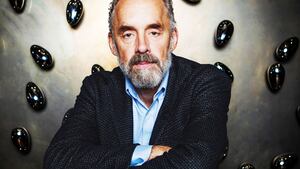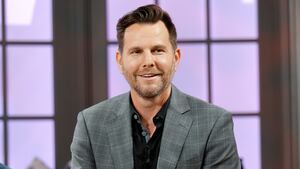Regrets, he has a few.
Sam Harris, the author, neuroscientist, and host of the popular Making Sense podcast, was one of the anti-woke media figures profiled in a much-discussed 2018 New York Times opinion feature on the so-called “Intellectual Dark Web.” He was also the first of that cohort to renounce his “fictitious” membership in the unofficial gaggle, on the grounds that he didn’t want to be associated with some of his erstwhile allies’ COVID vaccine denialism, Trump election fraud lies, and a host of increasingly unhinged conspiracy theory obsessions.
In a conversation with Josh Szeps, released this week on Szeps’ Uncomfortable Conversations podcast, Harris went further still, naming and shaming certain IDW figures for practicing a “new religion of contrarianism and conspiracy thinking.”
While the group had once been united against what Harris calls “the woke mind virus”—which he says has infected institutions like science, academia, and journalism—Harris now says he’s confounded by certain behavior among that squad, such as fellow IDWer Bret Weinstein doing “a hundred episodes of his podcast in a row on the terrors of mRNA vaccines—and the sinister, shadowy cabal of people who have suppressed information about the life-saving power of ivermectin. It’s completely crazy.”
Harris referred to a number of IDWers as “erstwhile smart people” who now say that “the most qualified experts on many questions—whether you’re talking about what wars to fight or what medicines to give your kids—have been captured by sinister influences of power, or such comprehensively bad incentives, that basically everyone you should have been able to trust yesterday is now wrong about very important topics. [But] the outlier voices shrieking in the wilderness are right about all of them, no matter how much they may seem like crackpots.”
Some of his former allies have gone so far through the conspiratorial looking glass, Harris says, that “they’ll start telling you how they were denied a Nobel Prize.”
Harris and Szeps both acknowledged their belief that some of this conspiracy theorizing is fueled by failures of crucial institutions.
In particular, Szeps expressed frustration with what he describes as the groupthink among mainstream outlets on certain topics of which reasonable disagreement should be able to take place—such as allowing psychiatrists some latitude on how to treat children with gender dysphoria without labeling them transphobic, or whether certain vaccines make sense for every person. The implication is that zero-tolerance prohibitions in many newsrooms, classrooms or on social media that forbid dissent (or sometimes, even discussion) on these subjects has contributed to some once-reasonable people going down conspiracy theory rabbit holes.
“When you see information being politicized… and truly reputable people are being silenced or ignored or shadow-banned on Twitter, it’s catnip for anyone who wants to connect all of the dots in a way that seems sinister,” Harris said. “The crazy interpretation is that this is all being orchestrated by some star chamber somewhere at Davos. And this is all about a comprehensive effort to get people to bend the knee to increasingly stringent misuses of state power.”
He cited IDW commentator Maajid Nawaz’s obsession with “every COVID policy… softening us up for the Orwellian boot that would never stop stomping on our faces. I just think that’s bonkers.”
But Harris saved his most strident criticisms for Dave Rubin—the YouTuber who spun a brief stint as the host of a little-seen panel show on the progressive Young Turks Network into a lucrative persona as MAGA’s favorite “Why I Left the Left” commentator and activist.
Rubin has frequently said that his political “awakening” (or why he “left the left”) was inspired by watching Harris and Ben Affleck argue about Islam on an episode of Real Time with Bill Maher. Harris was subsequently the first guest on Rubin’s rebooted YouTube show. In short, Rubin’s origin story as a “public intellectual” is inextricably linked to Harris.
I interviewed Harris in 2018 for a Daily Beast feature on Rubin, and he was very complimentary of both the man and his show. But, Harris said, Rubin was being “captured” by his audience. Fear of offending his right-wing viewer base, Harris said, was why the ostensibly “liberal” Rubin would never criticize Trump for anything, at all.
Now, in 2023, Harris says Rubin is the “quintessential” example of audience-capture.
“Rubin became far more cynical than I would have thought possible. And it’s very depressing. He was a friend, he’s not a friend anymore,” he said. Harris put much of the blame on the influences of Twitter and Trump. “The real Trump derangement syndrome was not to have seen how appalling and dangerous and deranging it was to have a person like this get anywhere near the Oval Office,” Harris added.
Szeps pushed back, expressing disappointment that Harris wasn’t as self-reflective as he could have been in assessing his own endorsements of certain people who turned out to be (essentially) nuts or frauds.
“Are you a bad judge of character?” Szeps asked.
Harris demurred, saying most of the people he’s now embarrassed by are IDW-adjacent figures he says he’s never met (or maybe met once).
But Harris leveled no criticism at IDW guru Jordan Peterson—who has become a fire-breathing culture warrior who, among other things, compares doctors performing trans surgeries to Nazis, says plus-size magazine models are part of an authoritarian plot, and muses that Dr. Anthony Fauci should be “encased in styrofoam and bubble wrap.” Harris also didn’t lump IDW superstar Joe Rogan in with the “bonkers” conspiracy types, despite Rogan’s constant self-pantsings as he gleefully runs with false conspiracy theories about vaccines and other culture war hot potatoes, often without deploying so much as a Google fact check.
However, Harris stressed that of all the core IDW figures, there’s less daylight between himself and Eric Weinstein—Bret’s brother, a mathematician who worked for Peter Thiel’s investment firm. (Weinstein also coined the term “intellectual dark web”—which he has at various times described as a half-joke, but also a meticulously calibrated bit of mathematical genius.)
While Harris’ dig at Intellectual Dark Webbers who believe nefarious institutional gatekeepers have kept them from winning Nobel prizes sure seems like an allusion to the Weinsteins, he has little to say about Eric’s own routine conspiracy theorizing. Such highlights of the genre include his obsessive tweets suggesting Jeffrey Epstein didn’t kill himself, and that media outlets are colluding to suppress coverage of the story. Weinstein, more recently, made grandiose proclamations about pre-Elon Musk Twitter being run by “evil souls, covertly playing G-d over news, elections, reputations, [and] direct ideological manipulation of human discourse.”
And this isn’t new behavior, either. In a curious case of both galaxy brain conspiratorialism and tribalist wagon-circling, Weinstein in 2019 blamed Rubin’s descent into shameless MAGA activism on a conspiracy driven by a “perma-swarm” of haters “seemingly to get him to become desensitized to all criticism.” (The much less conspiracy-minded explanation would be that Rubin has demonstrated a keen sense of smelling which direction the right-wing money is headed, and has no compunction about jettisoning his supposedly bedrock principles when it’s financially advantageous to do so.)

Or as Harris put it, Rubin’s doing what his business model requires—“He has no career outside of Trumpistan.”
I feel for Harris, truly. It’s frustrating (and sometimes even embarrassing) when your judgment fails you in assessing a person, be it in a personal or professional relationship. Lord knows it’s happened to me, too. But it’s hard to be 100 percent sympathetic.
Regarding Harris’ career-making endorsement of Rubin—the evidence was always in plain sight that Rubin’s utility was serving as a professional sycophant—a hype-man armed with a thin intellect and possessing no actual political convictions. Harris thinks Rubin has changed, when really he’s just evolved into a more unapologetic version of the clout-chaser he was back when he was still in Harris’ favor. Indeed, it was Rubin’s obsequious flattery—now mostly reserved for MAGA and DeSantis stans—that made his show an attractive platform for people like Harris and the IDW in the first place.
Or as Szeps put it, Rubin was “an enthusiastic puppy dog,” who saw Harris and the IDW as an asset he wanted a piece of—which was nice for a while. But now the puppy has a new master in the MAGA/DeSantis world.
As for the larger group, conspiracy theorizing was always a key plank in the Intellectual Dark Web’s branding (I mean, just say the name out loud and you’ll sound like you need to go touch some grass). It’s hardly surprising that many of the people who embraced such a label would drift so quickly into a version of Alex Jones with a thesaurus.
So, here’s one cheer for Sam Harris for naming and shaming (some) of his past allies and their unsavory career moves. But only one cheer, because he’s still letting some mortifying IDWers off the hook for behavior he’s decried in others, and he hasn’t yet truly reflected on why he was so taken in by dim careerists and a movement built more on emotional opposition to wokeness than a noble pursuit of truth and vigorous debate.
Still, better late than never, Sam Harris is justly embarrassed by the Intellectual Dark Web phenomenon he helped create. And that’s important. The first step is admitting the problem.












